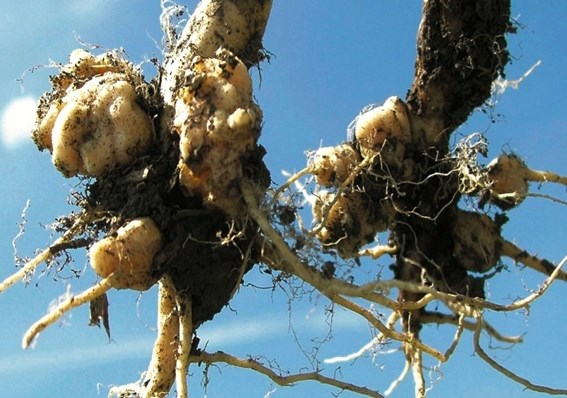A clubroot policy is now in effect across the MD of Bonnyville, meaning farmers in contravention of the policy can have their fields destroyed.
“Clubroot is a very drastic invasion of our lands,” said Reeve Ed Rondeau. “The longer we can keep it away and the more we can educate the farmers on clubroot the better off the entire municipality is for it.”
MD council has been in negotiations with major canola producers in the region to draft a policy to prevent the spread of clubroot. Council green lit the policy during a Nov. 25 meeting to begin enforcing a provincial law giving the MD the right to carry out random inspections in fields by council-appointed inspectors.
“By having this proactive policy in place we'll reduce the spread from those two locations that we presently have and hopefully it won't spread to any further locations with the restrictions that are being put in place in there,” said Matt Janz, director of agriculture for the MD.
A serious soil-borne disease, clubroot can cause a major headache for producers if a crop contracts the disease as there is no way to completely get rid of the disease and it will stay in the soil for approximately 20 years.
Under the policy, inspectors entering land when testing clubroot will have to wear protective, disposable boot covers. All tools will be soaked in a bleach solution between fields and MD vehicles will be parked on road allowances and will not enter private lands when conducting inspections. Positive identification of clubroot shall be obtained through an approved laboratory test.
When the land has been verified positive for clubroot, the landowner will be notified in person by the agricultural fieldman. A notice will be issued for that field mentioning a restriction on the growth of canola, mustard or any other crop susceptible to clubroot on the affected land for a period of four years, and the owner must use a clubroot-resistant canola variety at the start of the following rotation.
Any land sown in contravention of the terms will be destroyed as per the Agriculture Pest Act.
All adjacent landowners and occupants to the affected land will be notified in writing that clubroot is present. Alberta Agriculture and Forestry, Agriculture Financial Services Corporation, and parties with genuine commercial interest may also be given the location of affected lands at the discretion of council.
The landowner and occupants of the land will have the responsibility to follow best management guidelines set by Alberta Agriculture and Forestry as well as the guidelines set by the MD to reduce the spread of the disease with the movement of soil and equipment.
There have been two reported cases of clubroot in the MD since August. Farmers located on those two properties have been notified of the policy and are comfortable moving ahead with it.
“Our council felt that it was important to get feedback from the local farmers,” Janz noted. “They all decided unanimously that staying with this tight of a policy and going that four year rotation is very important for them for protecting their agricultural land in the future.”
He added, “I know council was a little surprised that they agreed to such harsh consequences if somebody was in contravention of the act, but they chose to go with the harder rules.”
The policy will be reviewed within five years.



